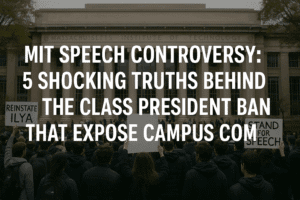MIT Speech Controversy: 5 Shocking Truths Behind the Class President Ban That Expose Campus Complicity
MIT barred its elected Class President, Megha Vemuri, from her undergraduate commencement ceremony after she delivered an unapproved pro-Palestinian speech during a pre-graduation event. Vemuri directly accused MIT of “aiding and abetting” Israel’s assault on Gaza through research ties with its military, citing significant Palestinian casualties and the destruction of Gaza’s universities. While her speech drew cheers and Palestinian flags from peers, university officials claimed she “deliberately misled” organizers and disrupted the ceremony, banning her despite affirming support for free expression.
This silencing starkly contrasted with President Kornbluth’s commencement address urging graduates to champion scientific inquiry and tolerate disagreement, conspicuously avoiding mention of Vemuri’s exclusion. The incident mirrors recent actions like NYU withholding a diploma over a similar Gaza protest speech, suggesting a pattern of institutions suppressing unsanctioned criticism of Israel. At its core, this clash forces difficult questions about the limits of permissible dissent on campus, the ethics of university research partnerships in conflict zones, and the true cost of challenging institutional power – leaving Vemuri with a degree but denied her ceremonial role, and the MIT community grappling with lasting questions about complicity and free speech.

MIT Speech Controversy: 5 Shocking Truths Behind the Class President Ban That Expose Campus Complicity
The iconic dome of MIT, a symbol of scientific progress and intellectual freedom, became the backdrop for a stark confrontation this week. The university’s decision to ban its own Class President, Megha Vemuri, from her undergraduate commencement ceremony following a powerful pro-Palestinian speech cuts to the heart of enduring tensions: institutional power, student activism, and the very meaning of free expression within the academy.
The Spark: A Speech That Defied Protocol
During Thursday’s “OneMIT” ceremony, a prelude to the main commencement, Vemuri diverged dramatically from the script approved by university organizers. Donning a keffiyeh, she delivered an impassioned address condemning MIT’s research ties with the Israeli military. Her words were direct and accusatory: MIT was “aiding and abetting” Israel’s assault on Gaza, an assault she stated has killed over 52,000 Palestinians. She invoked the obliteration of Gaza’s universities and framed MIT’s associations as complicity in genocide.
Her call resonated deeply with many peers, met by cheers, applause, and the visible display of a Palestinian flag. Vemuri highlighted that the undergraduate student body had previously voted to sever MIT’s Israeli ties, alleging they faced “threats, intimidation and suppression” from university officials. She concluded by invoking the symbolic MIT tradition of turning class rings – urging graduates to see the MIT name not just as a badge of honor, but as an “obligation” to challenge its role in ongoing violence.
The Response: Exclusion as Consequence
MIT’s retaliation was swift and severe. Less than 24 hours later, the university announced Vemuri was barred from participating in Friday’s main commencement, stripping her of the ceremonial role she’d earned. Spokesperson Kimberly Allen framed it as a matter of protocol, not politics: Vemuri had “deliberately and repeatedly misled Commencement organizers” and “led a protest from the stage, disrupting an important Institute ceremony.” While affirming MIT’s support for “free expression,” the administration stood firm on its punishment.
The contrast on commencement day was jarring. While President Sally Kornbluth spoke broadly about scientific thinking and the value of disagreement, her carefully calibrated remarks avoided any mention of the elephant in the room – the silencing of the elected student leader just steps away. Kornbluth urged graduates to become ambassadors for MIT‘s methods, a call that rang hollow for those aware Vemuri was absent precisely for embodying a form of critical engagement the administration deemed unacceptable.
Beyond MIT: A Pattern of Silencing?
This incident doesn’t exist in a vacuum. Just weeks prior, NYU withheld the diploma of graduate Logan Rozos after he similarly deviated from his approved speech to address Palestinian “atrocities.” NYU condemned his expression of “one-sided political views.” These actions suggest a troubling pattern where universities, facing intense political pressure and donor scrutiny over Israel-Palestine discourse, are increasingly willing to leverage administrative power – withholding diplomas, banning participation – to punish unsanctioned political speech, especially when it challenges institutional partnerships.
The Uncomfortable Questions:
- Protocol vs. Protest: Where is the line between a student leader “misleading” administrators and engaging in legitimate civil disobedience on a platform they earned? Does the sanctity of a ceremony outweigh the right to dissent, particularly on an issue of profound moral concern to the student body?
- Selective Enforcement: Would a speech deviating from script to celebrate uncontroversial achievements or call for unity have triggered the same severe consequence? The specific content of Vemuri’s critique appears intrinsically linked to the punishment.
- The Weight of Complicity: Vemuri forced an uncomfortable mirror onto MIT. Regardless of one’s stance on the conflict, her speech directly challenges universities to scrutinize their research partnerships and financial ties. When do such ties cross a line into enabling violence, and who gets to define that line?
- The Chilling Effect: What message does banning a class president send to other students? The threat of exclusion from a pinnacle academic moment is a potent deterrent, potentially stifling critical discourse on deeply contentious global issues.
A Ceremony Shadowed, A Debate Ignited
Megha Vemuri received her degree, but not the celebration she earned alongside her peers. Her absence from commencement was a powerful, silent protest in itself. MIT’s actions may have aimed to control the narrative, but they instead amplified the very questions Vemuri raised about complicity, institutional responsibility, and the boundaries of acceptable dissent. This incident transcends a single student or university; it reflects the immense difficulty academic institutions face navigating polarized global conflicts while upholding their stated ideals of open inquiry and critical engagement. The diploma may be awarded, but the debate over the cost of speaking truth to institutional power is far from settled.
You must be logged in to post a comment.